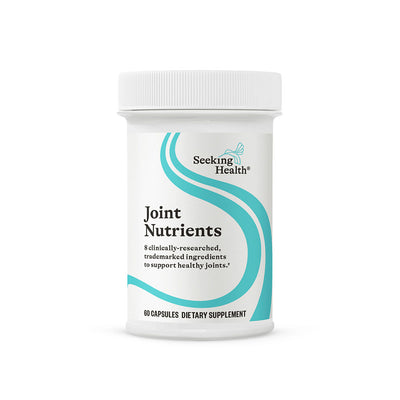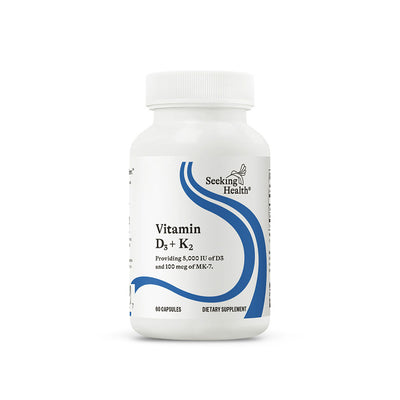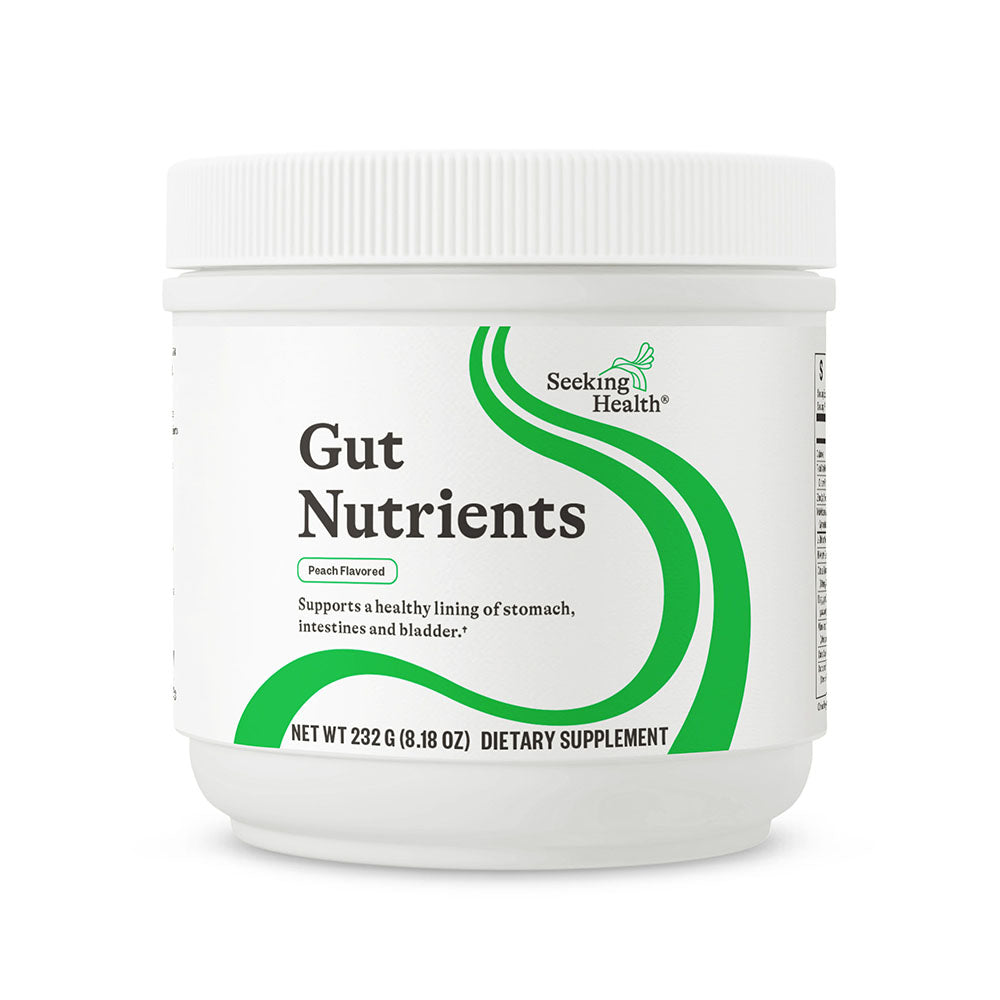Do you suspect you may have a "leaky gut" but have no clue what that even means?
Imagine your intestines as a fortress, keeping unwanted invaders out while allowing only the proper substances to pass through. In a healthy gut, the cells lining the intestines fit tightly together, forming a solid barrier to thwart the enemy. However, with a leaky gut—also called increased intestinal permeability—this barrier weakens, becoming more like a sieve than a solid wall.
If you think you might have a leaky gut, it's essential to consult with a knowledgeable healthcare professional who can help diagnose the issue and suggest a treatment plan tailored to your needs.
But first, learn all you can about leaky gut so you can go into your office visit confidently and be informed about your goals for supporting your health!
What Is Leaky Gut?
Having a leaky gut means that the lining of your intestines isn't as strong as it should be. Usually, the cells in your intestinal lining are packed tightly together, creating a barrier that controls what passes from your digestive system into your bloodstream.
Two main pathways in your gut can be weakened if your gut lining leaks:
- The transcellular pathway in your gut is where substances move directly through the cells lining your intestines. This pathway is like a controlled gate where nutrients and other necessary molecules are transported into the bloodstream through specific channels or transport proteins within the cells. This process is tightly regulated to ensure that only the proper substances get through, maintaining the health and function of the digestive system.
But when you have a leaky gut, the spaces between these cells become larger, making it easier for harmful substances like toxins, pathogens, and partially digested food to pass through and enter your bloodstream. - The paracellular pathway involves substances passing between the cells rather than through them. Typically, the cells in the intestinal lining are held together by tight junctions, which act like barriers controlling what can pass between the cells. In a healthy gut, these tight junctions only allow tiny molecules to pass through.
However, in a leaky gut, these tight junctions become loose or damaged, allowing harmful substances to slip through into your bloodstream. This can trigger an immune response and cause inflammation, leading to various health issues.

What Are Leaky Gut Symptoms?
Leaky gut is associated with various symptoms that can affect your entire body.
If you're experiencing a leaky gut, you may notice several common signs, including:
- Digestive problems like bloating, gas, or diarrhea. After eating, you may feel uncomfortably bloated and gassy, making it difficult to focus on tasks.
- Bloody stools. A leaky gut can lead to inflammation and damage of the intestinal lining, potentially causing small tears or ulcerations that result in visible blood in the stool.
- Frequent food sensitivities or allergies. You may notice that you often felt sick after eating dairy products, thinking you may have developed a new food sensitivity.
- Skin issues such as acne or eczema. You may still struggle with persistent breakouts on your cheeks and forehead despite trying various skincare routines.
- Constant fatigue or low energy. Even after a full night's sleep, you may yawn throughout the day and struggle to stay awake.
- Headaches or difficulty concentrating. You may lose focus while trying to work, and a dull ache may spread across your forehead.
- Joint pain or muscle aches. You may wake up with stiff, achy joints in the morning, making it challenging to start your day comfortably.
- Mood changes, including feeling low or restless. You may often feel irritable and restless for no apparent reason.
- Difficulties losing weight. If you've been struggling to lose a few pounds, but no matter how hard you try, you can't, you could be experiencing a leaky gut.
It's important to note that these symptoms can also be caused by other health conditions. If you're experiencing any of these issues, it's best to consult with your healthcare practitioner for proper diagnosis and treatment.
What Causes Leaky Gut?
While researchers are still studying the exact causes, several lifestyle and health factors are believed to contribute to developing a leaky gut. If you aren't managing life’s ups and downs well, it can weaken your body's defenses and affect gut health. Certain medications, like antibiotics and pain relievers, may also disrupt the balance of gut bacteria and damage your intestinal lining. Additionally, excessive alcohol consumption and smoking can irritate the gut and increase its permeability.
Here are 10 common factors that may contribute to a leaky gut:
- Chronic low mood. A prolonged low mood or chronic restlessness can weaken the gut's protective barrier by creating an imbalance in gut bacteria and increasing inflammation.
- Overuse of certain medications. Antibiotics can disrupt the balance of gut bacteria, while NSAIDs can directly damage the intestinal lining, potentially leading to increased permeability.(1,2)
- Excessive alcohol consumption. Alcohol can irritate the gut lining and disrupt the balance of gut bacteria, potentially increasing intestinal permeability.(3)
- Smoking. The toxins in cigarette smoke can damage the intestinal lining and alter gut bacteria, potentially contributing to leaky gut.(4)
- Nutrient deficiencies. A lack of essential nutrients like vitamin D and zinc can impair your gut's ability to maintain a strong barrier.(5,6)
- Lack of exercise. Insufficient physical activity can slow gut motility and alter gut bacteria, potentially contributing to increased intestinal permeability. However, too much exercise may weaken the gut barrier, too.(7)
- Chronic infections. Ongoing infections can cause persistent inflammation in the gut, potentially damaging the intestinal lining over time.(8)
- Autoimmune disorders. Conditions that cause the body to attack itself may be implicated in gut health and increase the risk of developing conditions like leaky gut.(9,10,11)
- Low thyroid function. Low thyroid function can slow gut motility and alter gut bacteria, potentially contributing to a leaky gut.(12)
- Environmental toxins. Exposure to certain chemicals and pollutants can damage the gut lining and disrupt the balance of gut bacteria.
If you have a condition called small intestine bacterial overgrowth (SIBO), it can lead to a leaky gut by disrupting the normal balance of bacteria in your digestive system. In SIBO, bacteria grow excessively in the small intestine, where there shouldn't be any at all. These extra bacteria can cause inflammation and damage to the intestinal lining.(13)
As the bacteria multiply, they produce toxins and gasses that irritate the gut wall. This irritation can lead to a leaky gut. The damaged gut lining becomes more porous, allowing partially digested food particles, toxins, and bacteria to pass through the bloodstream. This can trigger an immune response and inflammation throughout your body. SIBO can also interfere with nutrient absorption, potentially leading to deficiencies that may further compromise gut health. It can be a vicious cycle, making it critical to work with your healthcare practitioner to make a formal diagnosis and help prevent or improve leaky gut symptoms.
What Three Foods Cause a Leaky Gut?
Gluten, sugar, and dairy are three main foods that may cause a leaky gut. Gluten, a protein found in wheat, barley, and rye, can be particularly problematic if you have a gluten sensitivity or celiac disease. It can cause inflammation in your gut lining, leading to increased permeability. Even if you don't have any formally diagnosed sensitivities, consuming large amounts of gluten might irritate your gut over time.
Sugar, especially in excessive amounts, can also negatively impact gut health. It can feed harmful bacteria in your gut, creating an imbalance in your gut microbiome. This imbalance may lead to inflammation and damage to the intestinal lining. Similarly, if you have difficulty digesting dairy products and are lactose intolerant, you may have inflammation in your gut, potentially causing the lining to leak.
Your healthcare practitioner can help determine how these foods affect your gut. But take a deep breath and relax. Modifying your diet doesn't necessarily mean you'll have to give up the foods you love. It may just mean you must take a more thoughtful approach to your diet and practice moderation.

What Are Other Foods That Can Cause a Leaky Gut?
There are several other foods that may cause you to develop a leaky gut:
-
Processed foods. These often contain artificial additives, preservatives, and unhealthy fats that can irritate the gut lining and promote inflammation.
-
Foods low in fiber. A lack of fiber can lead to an imbalance in gut bacteria, potentially weakening the intestinal barrier.
-
Refined carbohydrates, like white bread and pasta. These foods are quickly converted to sugar in the body, potentially feeding harmful bacteria and causing inflammation in the gut.
-
Glutinous grains like barley, rye, and oats. If you have gluten sensitivity, these grains can trigger an immune response that damages the gut lining.
-
Alcohol. Excessive alcohol consumption can irritate the gut lining and disrupt the balance of gut bacteria, potentially increasing intestinal permeability.
-
Soda and caffeine. These beverages can increase gut inflammation and disrupt the gut's natural pH balance, potentially damaging the intestinal lining.
-
Processed meats. These often contain additives, preservatives, and high levels of saturated fats that can promote inflammation and harm gut health.
How Is Leaky Gut Diagnosed?
Several tests can provide clues about your gut health that your healthcare provider can use to investigate the issue further. These tests often involve analyzing blood, stool, or urine samples to detect specific markers that indicate a leaky gut.
For instance, a urine test might involve drinking a solution and then measuring the substances that pass through your gut lining into your urine. Blood tests can look for elevated levels of zonulin. This protein regulates gut permeability or antibodies the immune system produces in response to gut leakage.
In a nutshell, here are some common methods your healthcare practitioner can use to test for leaky gut:
- A clinical evaluation. First and foremost, your healthcare practitioner should sit down with you to get an overall picture of your symptoms and a complete medical history to rule out other health conditions and narrow down the potential causes of a leaky gut.
- A urine test. Your practitioner may have you drink a special solution to measure the substances that pass into your urine.
- A blood test. A blood test can check for elevated levels of zonulin or specific antibodies that may indicate a weakened gut lining.
- A stool test. We know, yuck. But, analyzing stool samples checks for markers like zonulin that may show your gut lining isn't functioning as it should.
- A hydrogen and methane breath test. Yep, your breath can be used to investigate for SIBO, which can contribute to a leaky gut.
How Do You Fix a Leaky Gut?

Fixing a leaky gut involves changing your diet and lifestyle habits to support gut health and overall wellbeing. These changes can also support a healthy intestinal lining.
What Dietary and Lifestyle Changes Support Gut Health?
Dietary
One of the most important steps you can take is to look for foods that may be causing inflammation or irritation in your gut. You may have to cut back on processed foods, sugar, and alcohol. Instead, you'll want to focus on eating a variety of whole, nutrient-rich foods that support gut health, such as fruits, vegetables, lean proteins, and fermented foods. If you support your gut health and get it in tip-top shape, you may be able to indulge and treat yourself every once in a while without issue!
Lifestyle
In addition to dietary changes, you'll need to examine your lifestyle habits closely. Constantly feeling low or agitated can negatively impact your gut health, so it's important to find ways to relax and unwind. Getting enough sleep and regular exercise can also help support your overall health and gut function.
In general:
- Support a balanced mood through relaxation techniques like yoga, meditation, and mindfulness.
- Get adequate sleep (7-9 hours per night).
- Exercise regularly.
- Stay hydrated.
It's also best to avoid the unnecessary use of medications like antibiotics and NSAIDs that can wreak havoc on your gut. However, supplements like L-glutamine(14) and the probiotics available at Seeking Health are thoughtfully designed to support gut health.†
Seeking Health Gut Health Support Supplements
You can count on Seeking Health to support your gut health needs. We offer several gut health support supplements that nurture healthy digestion, diverse gut microbiota, and histamine levels. Our supplements support a holistic approach to gut health, including sleep, exercise, and nutrition, to promote a healthy gut lining.†
Our line of gut health support supplements includes:
- Digestive Enzymes Chewable provides a convenient and tasty way to support healthy nutrient digestion, absorption, and comfort after eating.† It contains vegan digestive enzymes like galactomannans, invertase, and cellulase.
- Gut Nutrients mix easily with water to provide a comprehensive, nutrient-dense blend that supports gut health.† It includes L-glutamine, zinc L-carnosine, and N-acetyl-D-glucosamine.
- ProBiota HistaminX is a histamine-friendly probiotic formulated without strains known to produce high histamine levels. It comes in an acid-resistant capsule for targeted delivery to the gut.†
- Probiota Bifidobacterium is a probiotic that contains Bifidobacterium species only to support gut and immune system health.†
The Bottom Line
You don't have to keep suffering from the miserable symptoms of a leaky gut. After you speak with your healthcare practitioner, you can work together to identify your triggers and make the necessary changes to your diet and lifestyle to support gut health. Remember that it may take some time to feel significant relief, so patience will be essential. Getting used to a new way of eating and caring for your body can take a while.
Knowledge is power! You now have several tools at your disposal to support gut health. You know which foods, medications, and lifestyle habits can potentially cause a leaky gut and which can help support the overall health of your gut, so your risk of developing leaks in your gut lining may be lower. You also have the knowledge to confidently discuss with your healthcare provider what you can do to take charge of your overall health and wellbeing!
References:
- https://pubmed.ncbi.nlm.nih.gov/33330122/
- https://pubmed.ncbi.nlm.nih.gov/33762373/
- https://pubmed.ncbi.nlm.nih.gov/28988571/
- https://pubmed.ncbi.nlm.nih.gov/34220536/
- https://pubmed.ncbi.nlm.nih.gov/17962355/
- https://pubmed.ncbi.nlm.nih.gov/38732540/
- https://pubmed.ncbi.nlm.nih.gov/34179053/
- https://pubmed.ncbi.nlm.nih.gov/34886561/
- https://pubmed.ncbi.nlm.nih.gov/34925385/
- https://pubmed.ncbi.nlm.nih.gov/33594693/
- https://pubmed.ncbi.nlm.nih.gov/32192466/
- https://pubmed.ncbi.nlm.nih.gov/33746942/
- https://pubmed.ncbi.nlm.nih.gov/21960820/
- https://pubmed.ncbi.nlm.nih.gov/25810794/
† These statements have not been evaluated by the Food and Drug Administration (FDA). This product is not intended to diagnose, treat, cure, or prevent any disease.












